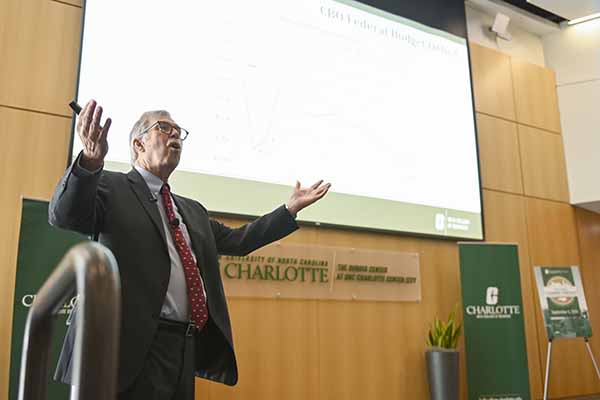U.S. Federal Reserve’s imminent decision, national election, other factors create uncertain mix for economy

In 2025, an important economic question will persist: Will there be a recession?
“The recession question is complicated by two issues,” said John Connaughton, UNC Charlotte professor of financial economics. “First, fiscal policy by Congress and the president has continued to fight the U.S. Federal Reserve and its attempt to slow inflation. To add a second complicating factor, a new federal administration will emerge in January, and the significant policy changes being discussed now as possibilities could adversely impact the economy, no matter who wins the election.”
Connaughton’s commentary on how federal policies affect pocketbooks and balance sheets was part of his North Carolina Economic Forecast 2024 Third Quarter Report, presented at a community session Thursday, Sept. 5, at The Dubois Center at UNC Charlotte Center City.
“Neither price controls nor tariffs would be good for the U.S. economy,” Connaughton said of potential economic policies. “We have strong evidence from history indicating that previous attempts to institute similar policies have led to an increase in inflation and a recession.”
Another major question on people’s minds is when — and how often — the U.S. Federal Reserve will cut interest rates. The Federal Reserve is expected to lower interest rates at its meeting on Sept. 17-18, but the question remains of how much.
The Federal Reserve has strongly signaled its intentions of making a cut at its September meeting, Connaughton said. “I would not be surprised to see three cuts this year, two guaranteed and a possibility of a third,” he said.
Connaughton anticipates 2024 will close on a positive note for the North Carolina economy, with the state’s Gross Domestic Product expected to increase by 2.7% over the 2023 level. GDP is the main measure of economic output.
In North Carolina, 2024 and 2025 would represent the fourth and fifth years of economic growth since the pandemic recession of 2020. While Connaughton puts the chance of a return of inflation at 50/50 in 2025, he sees less possibility of recession, giving it a 20/80 chance.
2025 Projections
Looking ahead to 2025, North Carolina’s real (inflation-adjusted) GDP growth rate is projected to slow just a bit, with an anticipated increase by 2.3% over the 2024 level. All 15 of the state’s economic sectors are projected to show output increases. The sectors with the strongest anticipated growth rates are:
- Information: 5.1%
- Mining: 3.4%
- Construction: 3.0%
- Agriculture: 2.7%
- Business and Professional Services: 2.6%
North Carolina employment is expected to add 53,400 net jobs, reaching 5,100,800 persons by December 2025, a 1.1% increase over the December 2024 employment level. By December of 2025, the state’s unemployment rate is expected to rise slightly over the anticipated rate of 4% for December of the previous year.
2024 Numbers
Looking at 2024, the report forecasts modest growth by year’s end. North Carolina’s real (inflation-adjusted) GDP growth rate is projected to increase by 2.7%. Of the state’s economic sectors, 14 are expected to see output increases. The sectors with the strongest anticipated growth rates are:
- Agriculture: 22.8%
- Retail Trade: 6.2%
- Construction: 6.0%
- Mining: 5.4%
- Information: 4.0%
- Nondurable Goods Manufacturing: 3.8%
North Carolina employment is expected to add 81,800 net jobs, reaching 5,046,600 persons by December 2024, a 1.6% increase over the December 2023 employment level. By December 2024, the state’s unemployment rate is expected to reach 4%.
The North Carolina Economic Forecast, which debuted in 1982, is released quarterly, under the direction of Connaughton, professor of financial economics with Charlotte’s Belk College of Business. The full report is available here.